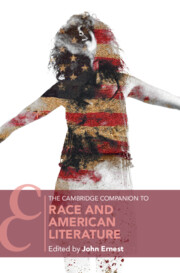Book contents
- The Cambridge Companion to Race and American Literature
- The Cambridge Companion to Race and American Literature
- Copyright page
- Dedication
- Contents
- Figures
- Contributors
- Acknowledgments
- Chronology
- Introduction
- Part I Foundations
- Part II Backgrounds
- Part III The Dynamics of Race and Literary Dynamics
- Chapter 8 “Dramatic Race”
- Chapter 9 Beyond Humanization
- Chapter 10 Shades of Whiteness and the Enigma of Race
- Chapter 11 There Is Here
- Part IV Rethinking American Literature
- Part V Case Studies
- Further Reading
- Index
- Cambridge Companions To Literature
Chapter 9 - Beyond Humanization
Decolonization, Relationality, and Twenty-First-Century Indigenous Literatures
from Part III - The Dynamics of Race and Literary Dynamics
Published online by Cambridge University Press: 02 November 2024
- The Cambridge Companion to Race and American Literature
- The Cambridge Companion to Race and American Literature
- Copyright page
- Dedication
- Contents
- Figures
- Contributors
- Acknowledgments
- Chronology
- Introduction
- Part I Foundations
- Part II Backgrounds
- Part III The Dynamics of Race and Literary Dynamics
- Chapter 8 “Dramatic Race”
- Chapter 9 Beyond Humanization
- Chapter 10 Shades of Whiteness and the Enigma of Race
- Chapter 11 There Is Here
- Part IV Rethinking American Literature
- Part V Case Studies
- Further Reading
- Index
- Cambridge Companions To Literature
Summary
This chapter seeks to trouble the understanding of how the category of the “human” is articulated in the theory and literature concerning race. It asks how one might view the category of the “human” differently when the focus is shifted from Blackness to Indigeneity. Departing from the premise that Black studies recurringly examines the question of which bodies are assigned a fully human status in a white-dominated society, the chapter posits that Indigenous studies and literatures interrogating the category of the “human” oftentimes ask a question that moves beyond dehumanization: namely, how the human is constructed or constituted in relation to other forms of life, other-than-human or more-than-human, including the land itself. Beyond literary articulation and theoretical interest, this question also has political import as it works to shift the parameters of what is thinkable as politics under the auspices of settler colonialism, as this chapter shows through the analysis of present-day Indigenous poetry by Deborah Miranda (Esselen/Chumash) and Natalie Diaz (Mojave).
Keywords
- Type
- Chapter
- Information
- The Cambridge Companion to Race and American Literature , pp. 134 - 147Publisher: Cambridge University PressPrint publication year: 2024

